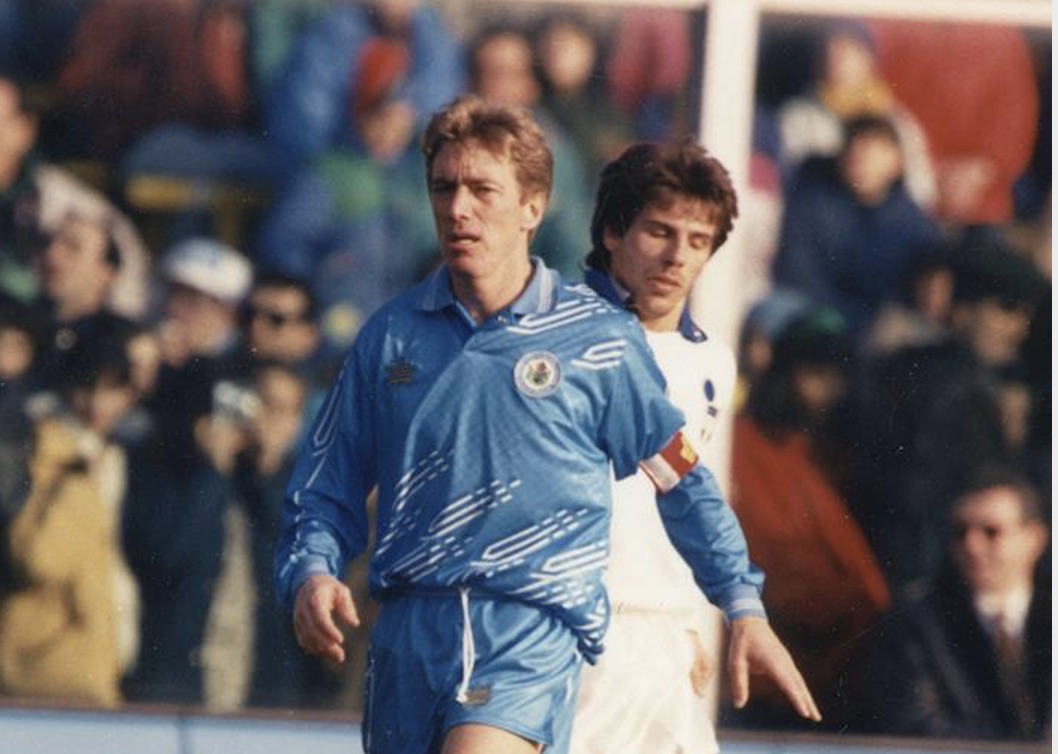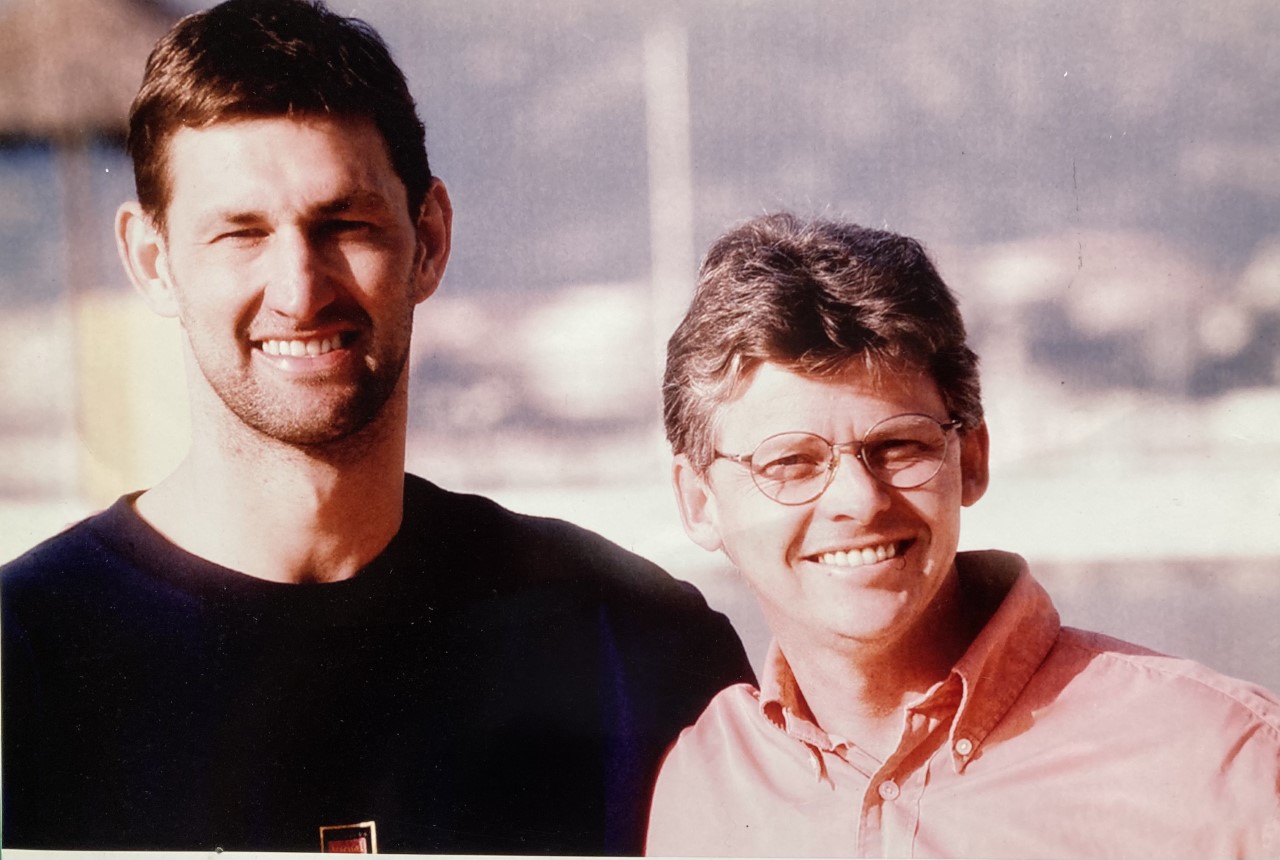Following San Marino’s little bit of history last weekend, Gregory Wakeman profiles their best ever player, Massimo Bonini.
San Marino’s goalless draw with Gibraltar last Saturday may not have made many waves on a big international weekend but it was a momentous occasion for the international small fry. While they are still ranked 210 out of 210 by FIFA, following their draw with Liechtenstein last month, it marked the first time that the Sammarinese have ever avoided defeat in back-to-back competitive fixtures.
Not much to celebrate? Well, for a team that has only recorded a solitary win in their entire history (a 1-0 triumph over Liechtenstein in April, 2004) it was enough to make their centre-back Dante Rossi cry with joy during his post-match interview. (https://twitter.com/SanMarino_FA/status/1327931559899516932)
Such a display of emotion means that Rossi is likely to go down in San Marino history as one of their most famous ever players. He’ll join Andy Selva, their all-time leading goalscorer with eight goals, including the winner in their only victory, and David Gualtieri, whose poked opener against England after just 8.3 seconds in November, 1993, is still the fastest goal in World Cup qualifying history.
When it comes to San Marino’s greatest player, though, there is really only one candidate. Step forward Massimo Bonini, whose successes at Juventus throughout the 1980s would rival those of most other professional footballers. His 19 international caps for San Marino tell a much different story, though, as they all, unsurprisingly, ended in defeat.
Bonini wouldn’t have wanted it any other way. Even though he was capped nine times by the Italian Under-21s and was entitled to play for the Italian national side, in order to do so he would have had to give up his San Marino citizenship. Bonini had no intention of making this sacrifice, and even though Enzo Bearzot and Azeglio Vicini, the national team managers during his pomp, asked him to play for Italy on several occasions, he repeatedly declined.
It is pretty obvious why Bonini was so sought after by the Italian national side. Over the course of 296 matches for Juventus between 1981 and 1988, he won three Scudettos, the Coppa Italia, the European Cup Winners Cup, the European Cup, the European Super Cup, and the Intercontinental Cup. The only trophy that Bonini didn’t pick up during his glittering tenure with the Bianconeri was the UEFA Cup, after they were knocked out by Panathinaikos in the Second Round of the competition in the 1987/1988 season.
The Juventus side of this era has rightfully gone down in history, but, as is usually the case with
players of his skill-set, Bonini’s gut-busting and hard tackling exploits have often been over-looked. They still are, which is excusable when you consider that, in front of Bonini, manager Giovanni Trapattoni had amassed some of the most iconic players of the decade.
There was Paolo Rossi, Italy’s Golden Boot winner at the 1982 World Cup. Marco Tardelli, who followed up his goal in that year’s final with one of the most famous celebrations in football history. The criminally under-rated Polish playmaker Zbigniew Boniek. And that’s before we get to Michel Platini, the midfield magician who won the Ballon d’Or three years on the trot, between 1983 and 1985, which still doesn’t do justice to how sublime he was for France and Juventus in this era.
It was Bonini’s industry, intelligence, discipline, and eye for a tackle that allowed this foursome to flourish. They all knew it, too. Legend has it that, after he was caught smoking in the dressing room by Juventus president Gianni Agnelli, Platini simply insisted that it only mattered that Bonini didn’t, as he did all of the running for the two of them.
What makes Bonini’s efforts even more impressive is the calibre of opposition he had to thwart every week during this period. By the start of the 1984-1985 season, Diego Maradona, Michael Laudrup, Liam Brady, Karl-Heinz Rummenigge, Falcao, Zico, Socrates, Junior, Graeme Souness and Ray Wilkins were all plying their trade in Serie A.
But while Juventus finished that campaign a lowly sixth, Bonini was at least able to help them win their first ever European Cup. Next time out, Juventus won their 22nd title, and it seems unfeasible that, if he’d made himself available, Bonini wouldn’t have been at the heart of Italy’s midfield for the World Cup in Mexico that summer.
Instead, he continued his self-imposed international sabbatical. All the way up to 1990, when the San Marino Football Federation gained UEFA membership. On November 14 of that same year, Bonini, who at this point had moved to Bologna, was finally able to make his international debut, at the age of 31, in a 4-0 defeat to Switzerland.
Bonini’s devotion to his home country even stretched beyond international football. After starting his career with his local Sammarinese team S.S. Juvenes, Bonini made sure that they were his final club, too. And people thought Terry Butcher was the textbook definition of patriotism.







Leave A Comment